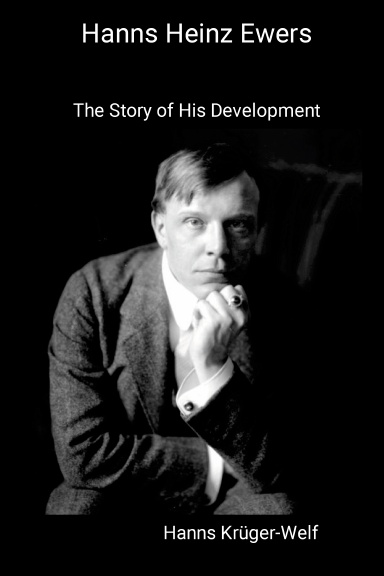By HANNS KRÜGER-WELF (Bandel Books; 1922/2024)
Here Joe E. Bandel, who specializes in translating early 20th century European literature, turned his attention to a little-known German language biography of Hanns Heinz Ewers (1871-1943). We know Ewers as a pioneering horror writer whose output includes classics of the form like the story “The Spider” (1915) and the Frank Braun trilogy of novels—THE SORCERER’S APPRENTICE (1910), ALRAUNE (1911) and VAMPIRE (1921)—but his contemporaries thought of him primarily as a poet, and it’s that aspect upon which author Hanns Krüger-Welf concentrates the majority of his scrutiny.
The fact that this book was published in 1922 is significant, as Ewers hadn’t yet destroyed his reputation by joining the Nazi party (which occurred in 1931). The other especially controversial event in Ewers’ life, when after relocating to New York City he was arrested in 1918 for spreading German propaganda, is glossed over in these pages. Regarding his subject’s bisexuality Krüger-Welf is even more tight-lipped, although he takes pains to emphasize Ewers’ sensitive and retiring nature, which he apparently concealed “behind cheekiness, impertinence and naughtiness.”
The man’s early years, according to Krüger-Welf, were idyllic, Ewers being “an unusually beautiful and charming child, with bright greenish eyes and blond curls, which earned him the nickname of the “Byzantine Christ Child” in artistic circles.” An upset occurred in 1885, when his father died, and a jilting by a lover impacted the teenaged Ewers even more greatly (it being the evident inspiration for the heartless woman portrayed in ALRAUNE). Those things did not, however, stop him from pursuing (and ultimately abandoning) a career as a lawyer, or from turning out a great deal of superlative prose.
Of Ewers’ writing Krüger-Welf is, again, quite partial to the poetry. The novels are given shockingly little coverage, and Ewers’ career as a screenwriter, which yielded classics like THE STUDENT OF PRAGUE (1913), is completely ignored.
One category in which Krüger-Welf can’t be faulted is advocacy. His passionate defense of Hanns Heinz Ewers and antipathy toward the “excessively unjust” attacks by the German critical establishment, are placed front and center. This book, then, is essentially an extended fan letter, and as such it works fairly well, making its points in a forceful and passionate manner. As a straight biography, however, it leaves a great deal to be desired.

